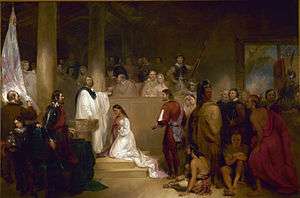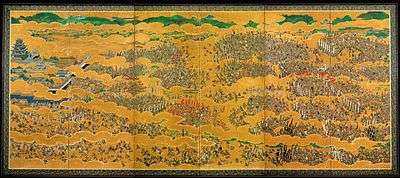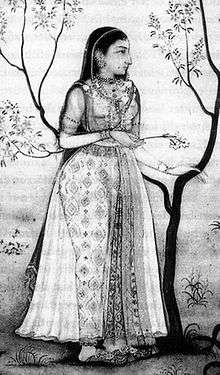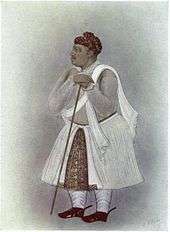1614
1614 (MDCXIV) was a common year starting on Wednesday of the Gregorian calendar and a common year starting on Saturday of the Julian calendar, the 1614th year of the Common Era (CE) and Anno Domini (AD) designations, the 614th year of the 2nd millennium, the 14th year of the 17th century, and the 5th year of the 1610s decade. As of the start of 1614, the Gregorian calendar was 10 days ahead of the Julian calendar, which remained in localized use until 1923.
| Millennium: | 2nd millennium |
|---|---|
| Centuries: | |
| Decades: | |
| Years: |
| 1614 by topic |
|---|
| Arts and science |
| Leaders |
| Birth and death categories |
| Births – Deaths |
| Establishments and disestablishments categories |
| Establishments – Disestablishments |
| Works category |
|
| Gregorian calendar | 1614 MDCXIV |
| Ab urbe condita | 2367 |
| Armenian calendar | 1063 ԹՎ ՌԿԳ |
| Assyrian calendar | 6364 |
| Balinese saka calendar | 1535–1536 |
| Bengali calendar | 1021 |
| Berber calendar | 2564 |
| English Regnal year | 11 Ja. 1 – 12 Ja. 1 |
| Buddhist calendar | 2158 |
| Burmese calendar | 976 |
| Byzantine calendar | 7122–7123 |
| Chinese calendar | 癸丑年 (Water Ox) 4310 or 4250 — to — 甲寅年 (Wood Tiger) 4311 or 4251 |
| Coptic calendar | 1330–1331 |
| Discordian calendar | 2780 |
| Ethiopian calendar | 1606–1607 |
| Hebrew calendar | 5374–5375 |
| Hindu calendars | |
| - Vikram Samvat | 1670–1671 |
| - Shaka Samvat | 1535–1536 |
| - Kali Yuga | 4714–4715 |
| Holocene calendar | 11614 |
| Igbo calendar | 614–615 |
| Iranian calendar | 992–993 |
| Islamic calendar | 1022–1023 |
| Japanese calendar | Keichō 19 (慶長19年) |
| Javanese calendar | 1534–1535 |
| Julian calendar | Gregorian minus 10 days |
| Korean calendar | 3947 |
| Minguo calendar | 298 before ROC 民前298年 |
| Nanakshahi calendar | 146 |
| Thai solar calendar | 2156–2157 |
| Tibetan calendar | 阴水牛年 (female Water-Ox) 1740 or 1359 or 587 — to — 阳木虎年 (male Wood-Tiger) 1741 or 1360 or 588 |
| Wikimedia Commons has media related to 1614. |

Events

December 4: Start of the Siege of Osaka
January–June
- February – King James I of England condemns duels, in his proclamation Against Private Challenges and Combats.
- April 5 – Pocahontas marries English colonist John Rolfe in Jamestown, Virginia.
July–December
- July 6 – Raid of Żejtun: Ottoman forces make a final attempt to conquer the island of Malta, but are beaten back by the Knights Hospitaller.
- August 23 – The University of Groningen is established in the Dutch Republic.
- September 1 – In England, Sir Julius Caesar becomes Master of the Rolls.
- October 11 – Adriaen Block and a group of Amsterdam merchants petition the States General of the Northern Netherlands for exclusive trading rights, in the area he explored and named "New Netherland".
- November 16 – The Treaty of Xanten ends the War of the Jülich Succession.
- November 19 – Hostilities resulting from an attempt by Toyotomi Hideyori to restore Osaka Castle begin. Tokugawa Ieyasu, father of the shōgun, is outraged at this act, and leads three thousand men across the Kizu River, destroying the fort there.
- December 4 – The Siege of Osaka begins.
Date unknown
- The French Estates General meets for the last time before the era of the French Revolution. In the interim, the Kingdom of France will be governed as an absolute monarchy.
- Scottish mathematician John Napier publishes Mirifici Logarithmorum Canonis Descriptio (Description of the Admirable Table of Logarithms), outlining his discovery of logarithms, and incorporating the decimal mark. Astronomer Johannes Kepler soon begins to employ logarithms, in his description of the Solar System.
- Tisquantum,[1] a Native American of the Wampanoag Nation, is kidnapped and enslaved by Thomas Hunt, an English sea captain working with Captain John Smith. Freed in Spain, Tisquantum (a.k.a. Squanto) will travel for five years in Europe and North America, before returning to his home in Plymouth, Massachusetts. Twenty months later, he will be able to teach the Pilgrims[2] the basics of farming and trade in the New World.
- The Rosicrucian Order is instituted in the Holy Roman Empire, according to Fraternitas Rosae Crucis.
- Christianity is banned throughout Japan.
Births
January–March
- January 1
- Henry Frederick, Hereditary Prince of the Palatinate (d. 1629)
- Luis Guillermo de Moncada, 7th Duke of Montalto, Spanish Catholic cardinal (d. 1672)
- January 5 – Archduke Leopold Wilhelm of Austria, Governor of the Spanish Netherlands (d. 1662)
- January 10 – Kanō Yasunobu, Japanese painter of the Kanō school of painting, during the Edo period (d. 1685)
- January 20 – Samuel Gott, English politician (d. 1671)
- February 2 – Robert Ellison, English politician (d. 1678)
- February 8 – Thomas Wendy, English politician (d. 1673)
- February 14 – John Wilkins, English bishop, academic and natural philosopher (d. 1672)
- February 16 – Christopher Merret, English physician and scientist (d. 1695)
- March 3 – Sir Peter Leycester, 1st Baronet, British historian (d. 1678)
- March 8 – Hendrik van der Borcht II, German painter (d. 1676)
- March 15 – Franciscus Sylvius, Dutch physician and scientist (d. 1672)
- March 25
- Thomas Chicheley, English politician who fell from favour, during the reign of James II (d. 1699)
- Juan Carreño de Miranda, Spanish artist (d. 1685)
April–June
- April 1 – Martin Schoock, Dutch academic (d. 1669)
- April 2 – Jahanara Begum, Mughal princess (d. 1681)
- April 10 – William Thompson, English Member of Parliament (d. 1681)
- April 11 – Helena Fourment, Dutch model, second wife of Peter Paul Rubens (d. 1673)
- April 18 – Nicolas Robert, French painter (d. 1685)
- April 25
- Hieronymus van Beverningh, Dutch diplomat and politician (d. 1690)
- Marc'Antonio Pasqualini, Italian opera singer and composer (d. 1691)
- May 10 – Zacharias Wagenaer, secretary, painter, then merchant and administrator (Dutch East-India Company) (d. 1668)
- May 12 – Giovanni Bernardo Carboni, Italian painter (d. 1683)
- May 28 – Gustav Evertsson Horn, Finnish-Swedish politician, Field Marshal (d. 1666)
- June 15 – Emilie of Oldenburg-Delmenhorst, Regent of Schwarzburg-Rudolstadt (1646–1662) (d. 1670)
- June 24 – John Belasyse, 1st Baron Belasyse of England (d. 1689)
July–September
- July 10 – Arthur Annesley, 1st Earl of Anglesey, English royalist statesman (d. 1686)
- July 23 – Bonaventura Peeters the Elder, Flemish marine painter (d. 1652)
- August 3 – Juan de Arellano, Spanish artist (d. 1676)
- August 13 – Augustus, Duke of Saxe-Weissenfels, administrator of the archbishopric of Magdeburg (d. 1680)
- September 7 – Gustaf Otto Stenbock, Swedish soldier and politician (d. 1685)
- September 11 – Philipp Buchner, German composer (d. 1669)
- September 12 – Robert Packer, English politician (d. 1682)
- September 20 – Martino Martini, Italian missionary, cartographer and historian (d. 1661)
- September 25 – Giles Hungerford, English politician (d. 1685)
- September 27 – Daniel Hallé, French painter (d. 1675)
- September 28 – Juan Hidalgo de Polanco, Spanish composer (d. 1685)
October–December
- October 3 – Sigmund von Erlach, Swiss politician (d. 1699)
- October 6 – Francesco de' Medici, Tuscan prince (d. 1634)
- October 12 – Henry More, English philosopher (d. 1687)
- October 13 – Thomas Jones, English politician and judge (d. 1692)
- October 20 (bapt.) – Franciscus Mercurius van Helmont, Flemish alchemist (d. 1698)
- November 2 – Philip Dietrich, Count of Waldeck-Eisenberg (1640–1645) (d. 1645)
- November 4 – Alexander Charles Vasa, 5th son of King Sigismund III of Poland (d. 1634)
- November 11 – John Bulkeley, English politician (d. 1662)
- November 27 – Fernando de Meneses, 2nd Count of Ericeira, Portuguese noble (d. 1699)
- November 30 – William Howard, 1st Viscount Stafford of England (d. 1680)
- December 16 – Eberhard III, Duke of Württemberg (d. 1674)
- December 21 – Francis Anderson, English politician (d. 1679)
- December 27 – Béatrix de Cusance, Frenc-Comtois noble woman (d. 1663)
- December 31 – Mechtilde of the Blessed Sacrament, French nun (d. 1698)
Date unknown
- Franciscus Sylvius, German scientist (d. 1672)
- Song Wan, Qing Dyansty poet and politician
Deaths
January–March
- January 2 – Serafino Porrecta, Italian theologian (b. 1536)
- January 21 – Morosina Morosini-Grimani, Venetian patrician and dogaressa (b. 1545)
- February 5 – Jakob Ebert, German theologian (b. 1549)
- February 13 – Thomas Cambell, Lord Mayor of London (b. 1536)
- February 23 – Murakoshi Naoyoshi, Japanese samurai (b. 1562)
- February 27 – John Harington, 2nd Baron Harington of Exton, England (b. 1592)
- February 28 – Jean Richardot the Younger, Belgian politician (b. 1570)
- March 5 – Thomas Pounde, English Jesuit lay brother (b. 1538)
- March 14 – Henrich Smet, Flemish physician (b. 1535)
- March 22 – Filippo Salviati, Italian astronomer (b. 1582)
April–June
- April 2 – Henri I de Montmorency, Marshal of France (b. 1534)
- April 7 – El Greco, or Domênikos Theotokópoulos (Greek: Δομήνικος Θεοτοκόπουλος), Cretian painter, sculptor and architect (b. 1541)
- April 28 – John Egerton, English politician (b. 1551)
- May 3 – Sasbout Vosmeer, Dutch Apostolic Vicar (b. 1548)
- June 13 – Sengoku Hidehisa, Japanese daimyō (b. 1552)
- June 15 – Henry Howard, 1st Earl of Northampton, important English aristocrat and courtier (b. 1540)
- June 17 – William Bathe, Irish Jesuit priest (b. 1564)
- June 27 – Maeda Toshinaga, Japanese daimyō (b. 1562)
July–September
- July 1
- Maximiliano de Austria, Roman Catholic prelate who served as Archbishop of Santiago de Compostela (1603–1614) (b. 1555)
- Isaac Casaubon, French-born classical scholar (b. 1559)
- July 4 – Johannes Magirus the elder, German Lutheran theologian (b. 1537)
- July 6
- Sir Anthony Cope, 1st Baronet, English politician (b. 1548)
- Man Singh I, Rajput Raja of Amber (b. 1550)
- July 14 – Camillus de Lellis, Italian saint (b. 1550)
- July 15 – Pierre de Bourdeille, seigneur de Brantôme, French historian and biographer
- July 16 – Tsarevich Ivan Dmitriyevich, pretender to the Russian throne, son of False Dmitry II (b. 1611)
- July 19 – Akizuki Tanenaga, Japanese samurai (b. 1567)
- July 28 – Felix Plater, Swiss physician (b. 1536)
- July 30 – Walter Cope, English noble (b. 1553)
- August 3 – François de Bourbon, Prince of Conti, third son of Louis I de Bourbon (b. 1558)
- August 11 – Lavinia Fontana, Italian painter (b. 1552)
- August 21 – Elizabeth Báthory, Hungarian serial killer (b. 1560)
- August 22 – Philipp Ludwig, Count Palatine of Neuburg, Duke of Palatinate-Neuburg from 1569 until 1614 (b. 1547)
- September – Giovanni de Macque, Dutch composer (b. c. 1550)
- September 21 – Jerome Gratian, Spanish Carmelite and writer (b. 1545)
October–December
- October 2 – Carlo Sellitto, Italian painter (b. 1581)
- October 9 – Bonaventura Vulcanius, Flemish Renaissance humanist (b. 1538)
- October 15 – Peder Claussøn Friis, Norwegian clergyman and author (b. 1545)
- October 26 – Sibylla of Anhalt, Duchess consort of Württemberg (1593–1608) (b. 1564)
- November 15 – Catherine, Duchess of Braganza, Portuguese infanta (princess), claimant to the throne following the death of King Henry (b. 1540)
- November 29 – Mogami Yoshiaki, Japanese daimyō of the Yamagata domain (b. 1546)
- December 27 – Maximiliaan de Vriendt, Dutch new Latin poet and a civic office-holder in the city of Ghent (b. 1559)
Date unknown
- Bartholomäus Scultetus, mayor of Görlitz (b. 1540)
- Ebba Stenbock, politically active Swedish-Finnish noblewoman
References
- Squanto
- Pilgrim Fathers
This article is issued from Wikipedia. The text is licensed under Creative Commons - Attribution - Sharealike. Additional terms may apply for the media files.


.jpg)



